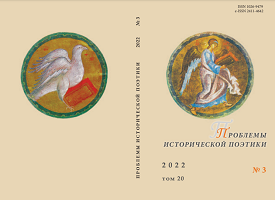Арктический хронотоп в повестях З. Давыдова «Беруны» и К. Бадигина «Путь на Грумант»
The Arctic Chronotope in the Short Novels by Z. Davydov “Beruny” and K. Badigin “The Way to Grumant”
Author(s): Tatiana V. Shvetsova, Veronika E. ShakhovaSubject(s): Sociology of Culture, Sociology of the arts, business, education, Theory of Literature, Sociology of Literature
Published by: Петрозаводский государственный университет
Keywords: Z. S. Davydov; K. S. Badigin; “Robinsons” from Mezen; Arctic; Svalbard; Grumant; Beruns; Arctic chronotope; act of a literary hero; motif;
Summary/Abstract: The article defines the significant components of the Arctic chronotope in the adventures of the Mezen “Robinsons.” The empirical basis of the research was the historical short novel (povest’) by Zinovy Davydov “Beruny” (1933) and the short novel (povest’) by Konstantin Badigin “The Way to Grumant” (1953). A comparative analysis of these works was carried out. The choice of texts is explained by the relatively little amount of research done on them and the specifics of the story being told, which centers around people of heroic professions — seafarers and whalers. The plot of the short novels of Z. Davydov and K. Badigin is based on a real event of the 18th century — the adventures of Russian sailors on a deserted island in the Arctic, described by P. L. Le Roy in 1766. Various aspects of the Arctic are presented by Z. Davydov and K. Badigin (the territory of eternal cold, the land of death, the entrance to the otherworld, the place of forced stay of the Pomors, the zone of extreme human experience, the apophatic image where death borders on life), acting as a real-geographical and actually artistic chronotope. The Arctic chronotope includes toposes and loci that determine the individual destinies of the Mezen. The article characterizes the behavior of the heroes in the liminal conditions of the Arctic chronotope. The harmony of the heroes’ consciousness with the rhythms of the objective world determines the possibility of survival of the “grumlans” on the island. A comparative analysis of the worldview of the hero of European literature (Robinson Crusoe by D. Defoe) and the heroes of Russian literature is carried out. The article considers the “hunting” and “survival” plot situations, which are the most representative for the behavior of the characters, and allows describing the unique features of the national and cultural identification of Russian “Robinsons” and comprehending the picture of the world depicted by the writers. It captures their special attitude to life and death, mythological worldview, adherence to the immutable laws of the Pomeranian fishing rite, the relationship of whalers with each other and the space in which they live.
Journal: Проблемы исторической поэтики
- Issue Year: 20/2022
- Issue No: 3
- Page Range: 232-252
- Page Count: 21
- Language: Russian

